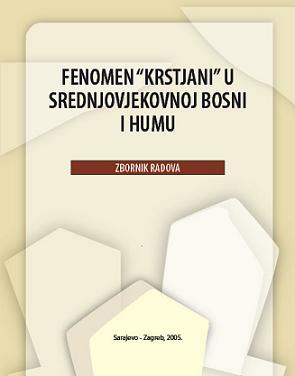Uporaba Svetoga pisma među bosanskim krstjanima
The Use of The Holy Bible among Bosnian ‘Krstjani’
Author(s): Mato Zovkić
Subject(s): Christian Theology and Religion, History, Middle Ages, Theology and Religion, South Slavic Languages, 6th to 12th Centuries, 13th to 14th Centuries, 15th Century, Biblical studies
Published by: Institut za istoriju
Summary/Abstract: Bosnian Christians were a sect of protest motivated by biblical poverty and simplicity in middle age Kingdom of Bosnia from about 1200 to 1463. An evidence of their use of Christian Scriptures can be found more in polemical writings of Latin theologians than in their own books and documents. This author has put this question within the middle age protest and renewal movements, like Cathars, Dominicans, Franciscans. Within the century from 1170 to 1270 a new type of Bible producing was invented in Paris and other medieval centers of theological learning, in form of one volume portable book which not rich people were able to provide and travelling preachers could carry it on their missionary journeys.
The most complete and preserved manuscript of Bosnian Christians is Hvalov Zbornik, written in 1404. It contains all New Testament canonical books, 150 canonical Psalms and eight Old Testament Canticles. Other preserved manuscripts and documents contain parts of the NT, prayers and letters which reflect the belief in Christ of Bosnian Christians, their liturgical Calendar and prayers for the dead. The Book of Revelation was mostly copied and commented among them. Latin theologians from Paulus Dalmatinus in 1250 to Cardinal Torquemada in 1461 mostly wrote polemical writings against Cathars and other sectarian movements and they also addressed Catharist sectarians in middle age Bosnia whom they accused of rejecting the Old Testament, teaching dualism and distorting the doctrine and practice of the sacraments. Most trustworthy remnants of real doctrine and pastoral practice of Bosnian Christians can be found in the questions of Bosnian Franciscans submitted to Pope Gregory XI in 1372. One of the problems was that some Christian men in Bosnia asked to be admitted to Christian marriage ceremony, but they insisted on their condition to their future spouse: “Si eris mihi bona” which involved the husband’s right to divorce his wife any time, for any reason. Bosnian Christians were a middle age movement of protest which for the sake of pure biblical religion finished in breaking communion with the Catholic Church. They disappeared with Turkish rule in Bosnia in 1463.
Book: Fenomen "Krstjani" u srednjovjekovnoj Bosni i Humu
- Page Range: 587-610
- Page Count: 24
- Publication Year: 2005
- Language: Croatian
- Content File-PDF

